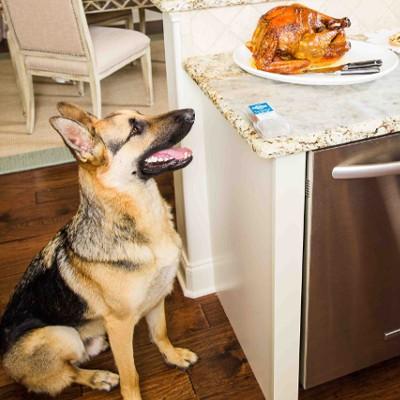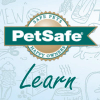By Darcy Lockman for The Dog Daily
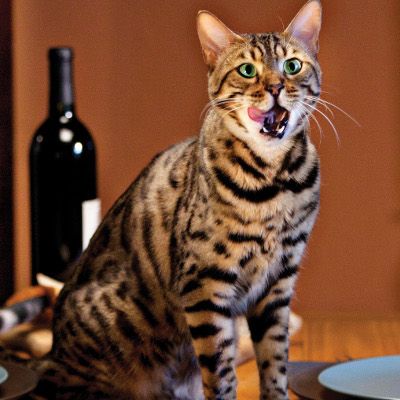
When dog owner George Kingsley of Brooklyn, N.Y., took his 5-year-old pug Sophie to a friend's holiday party last December, he was looking forward to the punch. What he didn't expect was that Sophie would enjoy it as much as he did.
"People were eating while standing, so they were holding their plates and forks, and resting their plastic cups full of vodka and cranberry punch on the floor. There was music playing, so no one heard Sophie darting around the room lapping up their drinks. I'm not sure how much she'd had by the time I noticed," recalls Kingsley.
While alcohol, like other recreational drugs, can be life-threatening to dogs, Sophie suffered only uncharacteristic hyperactivity in the few hours following her binge. Not all dogs or cats fare so well during the holiday season.

"The most common holiday-related food problem we see in dogs is chocolate toxicity," says Dr. Cynthia Hoeft, DVM, of the Eagle Fern Veterinary Hospital in Estacada, Ore. "People have a box of chocolate during the holidays and it sits out on the coffee table. The dog tears through the wrappers. If you've got a dog, don't leave chocolates within its reach," she advises.
Read on for more doggy don'ts and do's to keep your dog's health hearty throughout this, and any other, festive season.
-
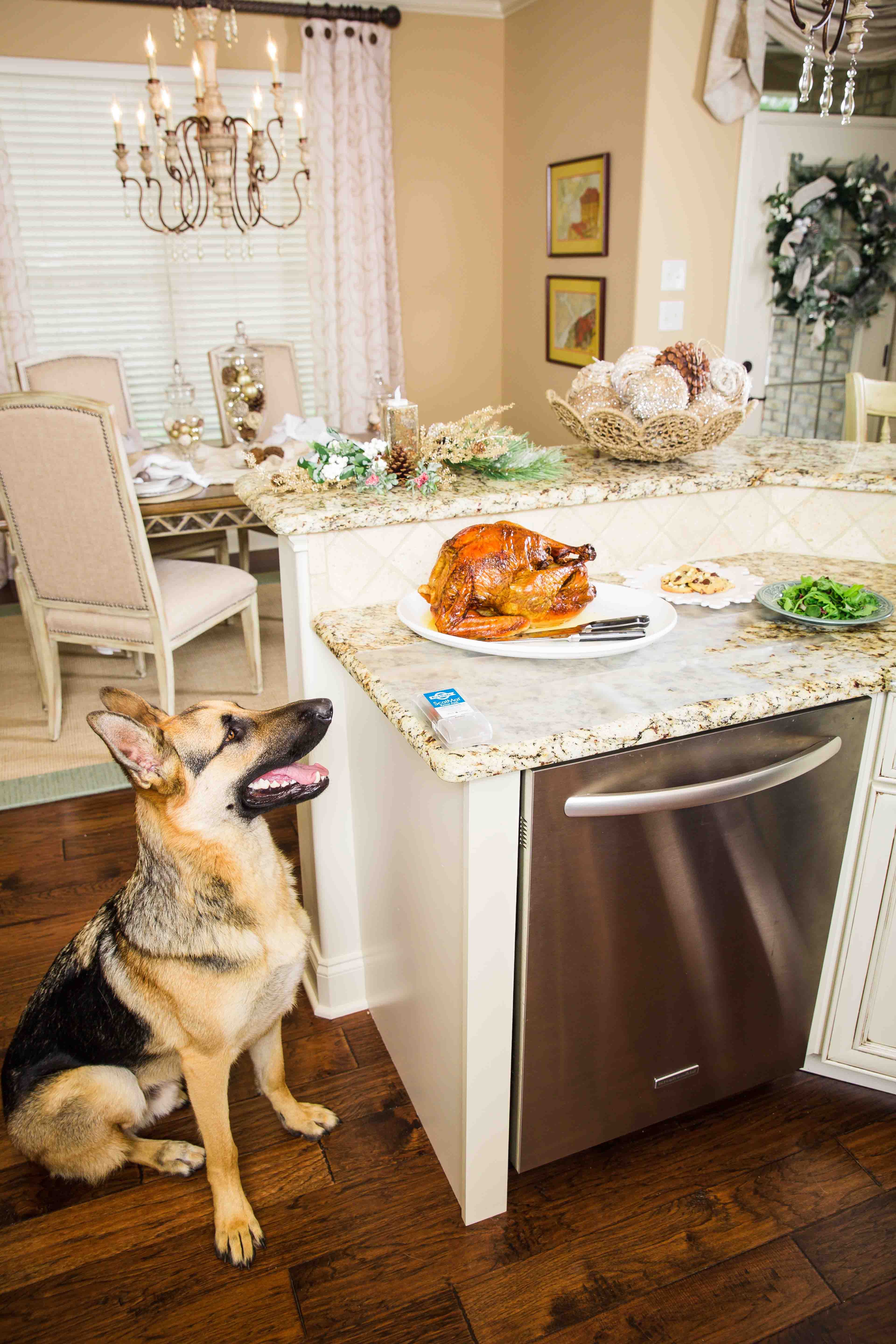 Don't Change Your Dog's Diet. Hoeft recommends that dogs consume a quality commercial dog food regularly, no matter the time of year. Substituting people food because you've got leftovers can only potentially do your dog harm. "We're concerned especially about spicy foods, which can create problems in the intestinal tract, and fatty foods, even a small amount of which can cause pancreatitis, which can be life threatening. Ingesting bones is also a danger. They can get stuck or puncture the intestinal tract."
Don't Change Your Dog's Diet. Hoeft recommends that dogs consume a quality commercial dog food regularly, no matter the time of year. Substituting people food because you've got leftovers can only potentially do your dog harm. "We're concerned especially about spicy foods, which can create problems in the intestinal tract, and fatty foods, even a small amount of which can cause pancreatitis, which can be life threatening. Ingesting bones is also a danger. They can get stuck or puncture the intestinal tract."
- Do Give an Occasional Holiday Treat. To minimize weight gain, treats should supply no more than 10 percent of your dog's daily caloric intake. That said, it's perfectly healthy to buy your furry friend a holiday-inspired cookie prepared especially for dogs. (These can often be found at specialty pet stores.) It's also safe to give your dog a small serving of white meat turkey or chicken -- without the skin.
-
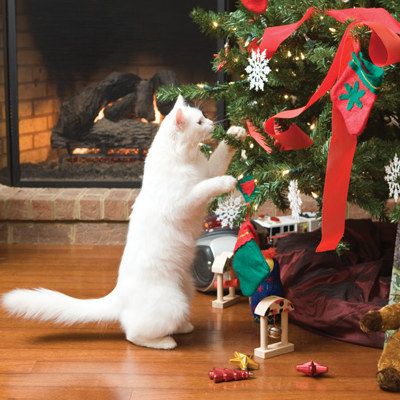 Don't Stock Up on Poinsettias. Holiday plants like poinsettias, mistletoe and Christmas cacti are toxic to dogs. If you choose to have these in your home, keep them out of mouth's reach of your pooch. The same holds true for Christmas accoutrements not found in nature. For example, dogs may try to ingest tinsel and small lights, which can lead to choking or gastrointestinal difficulties.
Don't Stock Up on Poinsettias. Holiday plants like poinsettias, mistletoe and Christmas cacti are toxic to dogs. If you choose to have these in your home, keep them out of mouth's reach of your pooch. The same holds true for Christmas accoutrements not found in nature. For example, dogs may try to ingest tinsel and small lights, which can lead to choking or gastrointestinal difficulties.
- Do Take Out the Garbage. With all the food around this time of year, some of it is bound to end up in the trash, soiled and ripe with mold. And there may be nothing closer to your dog's heart than stinky rubbish. "Systemic problems can result from a dog eating food garbage," says Hoeft, "It depends on the type of mold, but it can negatively impact a dog's organs." Having guests for dinner? Take the garbage out soon after they depart.
-
 Don't Let Your Guests Feed Rover. Admonishing your nearest and dearest to keep their dinner rolls to themselves might not be your favorite part of the evening, but nobody said being a responsible dog owner was fun. "If you're not comfortable making a blanket statement about not feeding the dog, be around the dog during the party for as long as you can, and then put him in a back room for the rest of the night," advises Hoeft.
Don't Let Your Guests Feed Rover. Admonishing your nearest and dearest to keep their dinner rolls to themselves might not be your favorite part of the evening, but nobody said being a responsible dog owner was fun. "If you're not comfortable making a blanket statement about not feeding the dog, be around the dog during the party for as long as you can, and then put him in a back room for the rest of the night," advises Hoeft.
- Do Call Your Veterinarian. If your dog ingests something you suspect is toxic, call your veterinarian immediately. "There are things you can do if it was just ingested," says Hoeft. "It's best to address the problem early." Foods that are dangerous for dogs include grapes, raisins, macadamia nuts, chocolate, tea, cola, cocoa beans, garlic and onions. Other off-limits ingredients include caffeine, salt, uncooked yeast dough and Xylitol, a sugar substitute that can cause canine liver failure. While indulging your dog's desire to sample every food within smelling distance might bring about minutes of glee, the long-term impact can obviously be anything but blissful. Sticking to the don'ts and do's of a dog's nutritional health -- regardless of the dates on the calendar -- will ensure that every season with your pooch is a jolly one.
Darcy Lockman is a freelance writer and frequent contributor to The Dog Daily. Her work has appeared in The New York Times and Rolling Stone. She lives in Brooklyn with the prettiest pug dog in the five boroughs.

